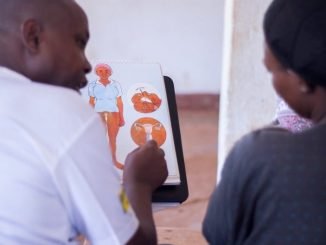
At the age of 42 years, Mr. Mutwalibi Isabirye Kakaire of Bulugodha village, Iganga district, one of the poverty stricken districts in Eastern Uganda, boasts of seven grandchildren. He will be recording his eighth in the next five months, giving him a small edge of three grandchildren ahead of his age mates, all under 45 years.
Mr. Isabirye, a father of 13 children including three sets of twins from four wives, has also recorded four deaths of children dying under the age of three, mainly due to diseases like measles.
Asked whether he still wants more children, Isabirye replied, “Yes, for as long as am still alive and sexually active, I will demand children from my wives.”
“Like my ancestors, I have to exploit the gift of procreation god gave me to ensure our clan’s lineage keeps growing, lest we get extinct and other clans get to dominate us,” he said.
“Am happy my two sons aged 21 and 19 years are emulating their ancestors as well. They too have started getting children and have three between them so far,” added Isabirye a traditionalist, who is aloof to family planning knowledge.
Like himself, his five married children – three daughters and two sons – are also primary six school drop outs. They all have children, with the eldest daughter, aged 24 years, having three children aged 6, 4 and 3 years respectively.
Isabirye’s three wives – all under 25 years – have suffered at least two stillbirths each, but continue to compete for positions as wives in his home area, which is saturated with many cases of unregulated births.
Not surprisingly, Isabirye and his wives do not utilize family planning services. “I do hear of child birth control services but I do not subscribe to such science,” says Isabirye.
“Some friends who used contraceptive pills ended up not enjoying the gift of motherhood while others have suffered numerous complications. With such examples, I am not seeking family planning services, as it will disrupt my marriage,” Isabirye’s third wife, Ms. Janat Kakaire, 20, chipped in the interview. We were seated in her three-roomed grass thatched house surrounded with other huts – homes to already married sons – in the homestead.
People like Isabirye would easily bring a smile on President Yoweri Museveni’s face. He has been quoted arguing that rapid population growth (irrespective of the quality in terms of skills) is good for Africa. He says a large population would form a larger market as is the case China and the Asian tigers.
Isabirye represents numerous large families living on less than a dollar a day in rural Uganda, a country with a population growth rate of over three per cent (3.2 per cent), occasioned by a fertility rate sic per cent, the third highest in the world.
This scenario replays itself across Africa and Asia due to reasons like lack of access to family planning services, or resistance by the populations, citing sexual taboos and the fear of losing fertility. Research attributes persistent ill health, maternal and infant mortality to the resultant situation.
Mr. John F. May, a specialist of population policies reveals that over the past decades, rapid population and reproductive health outcomes have hindered poverty reduction efforts, especially among the poorest countries?
“Without programs on population and reproductive health, we cannot improve the health of mothers and their children and the Millennium Development Goal (MDG) 4 and 5 will not be met,” Mr. May said at the International Conference on Family Planning: Research and Best Practices at the Speke Resort, in Munyonyo, Kampala.
Mr. May admits that World Banks’s programs in population, and especially reproductive health, have not been as rapid everywhere as initially anticipated.
“The gap with more advanced countries has been widening. This situation must be addressed, especially in the African region,” May said. “As we have done our work on HIV/AIDS, so should we do with family planning.”
By Sam Simba Ntale



